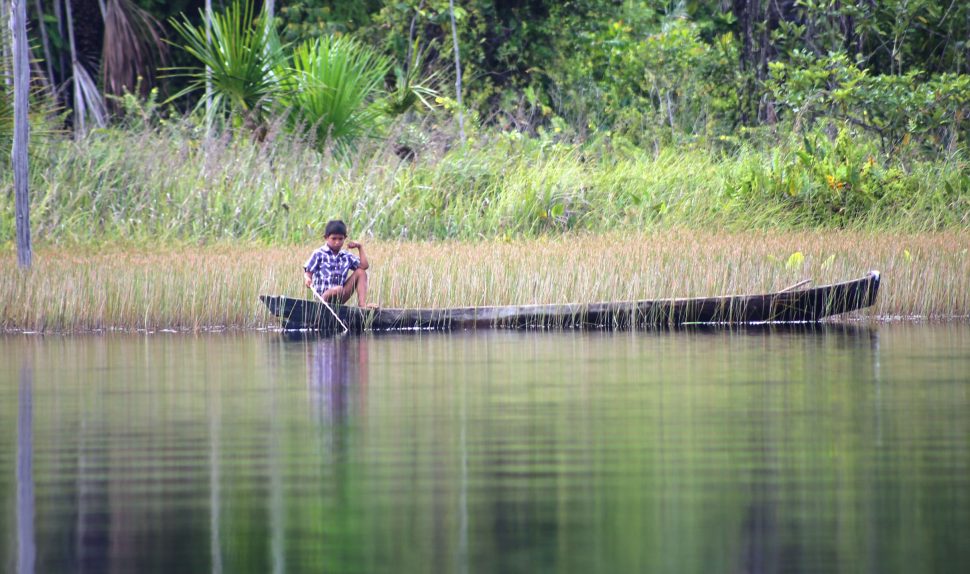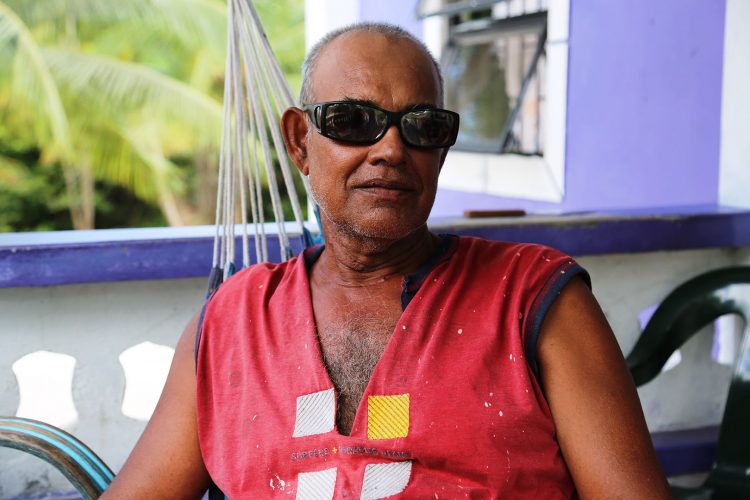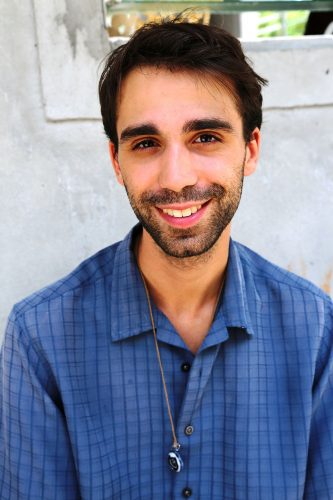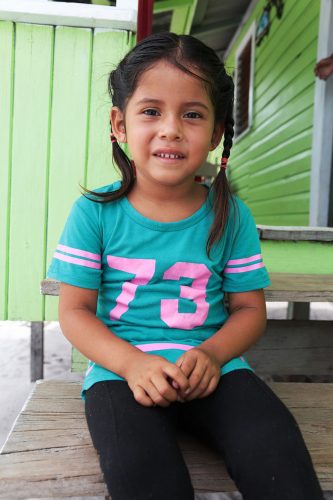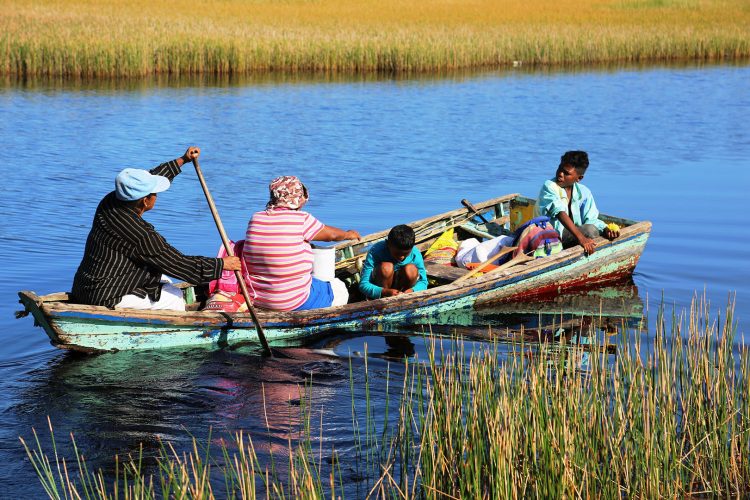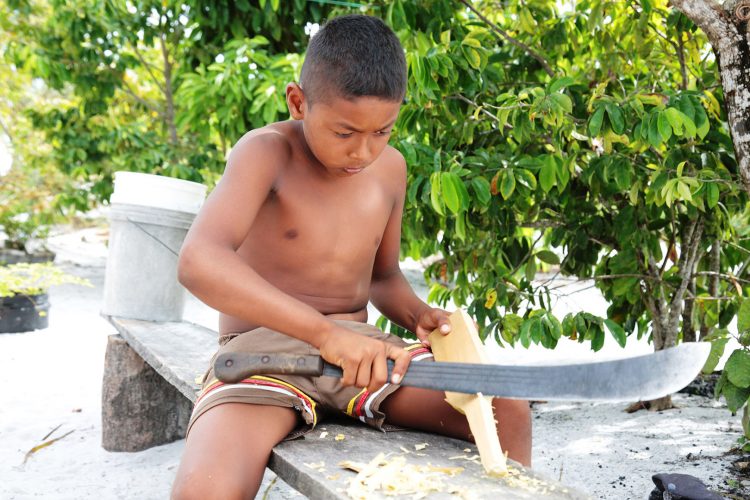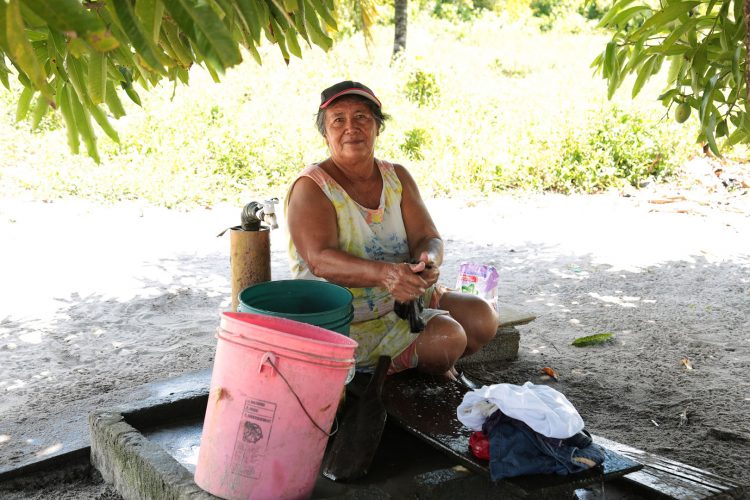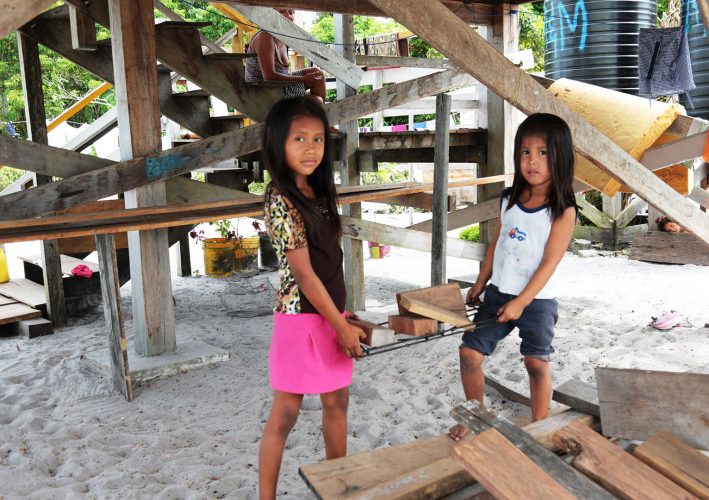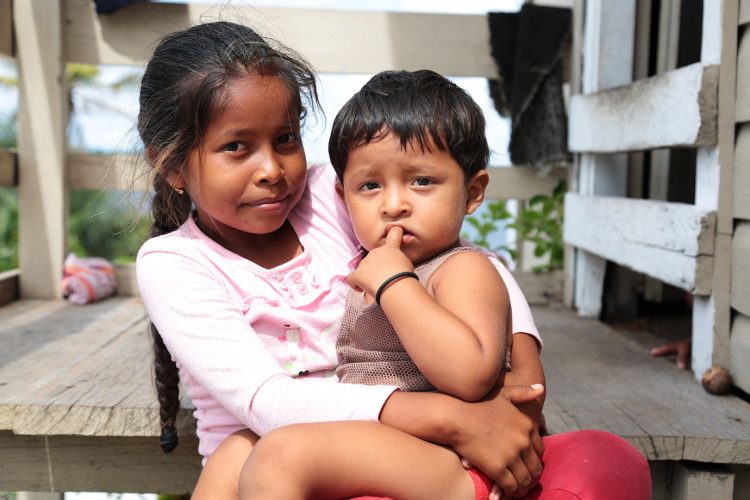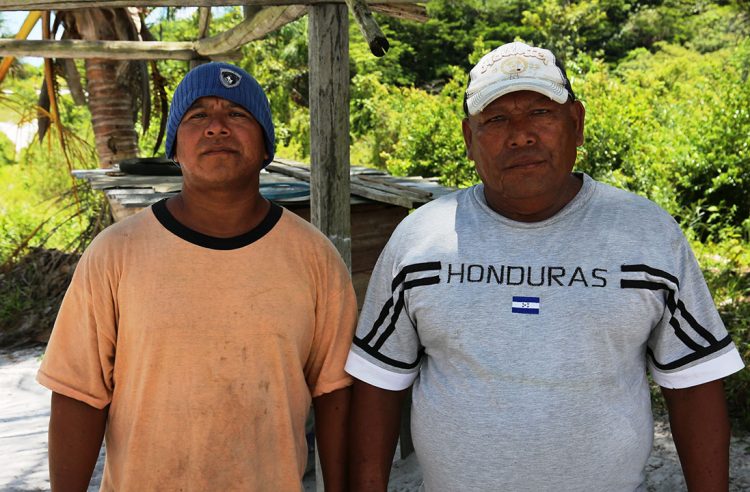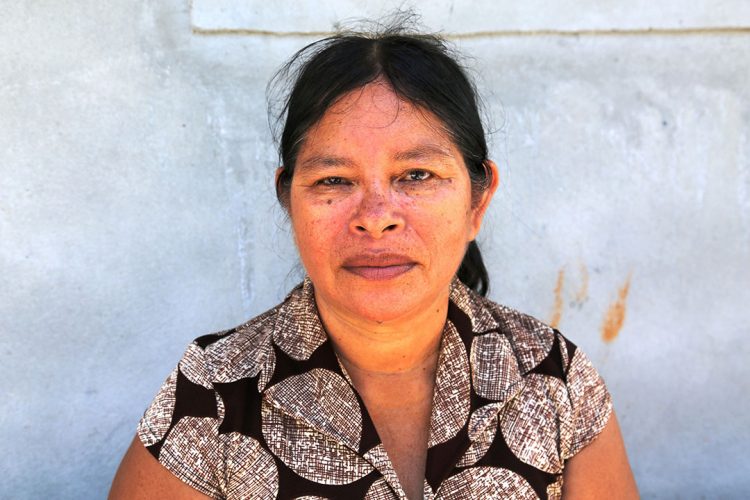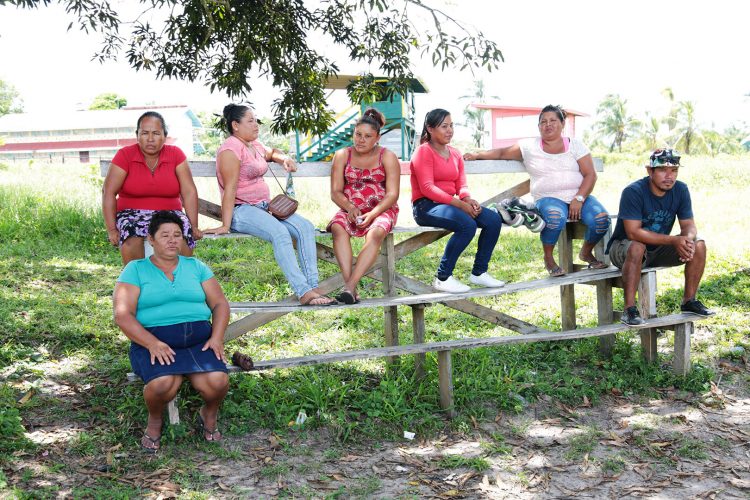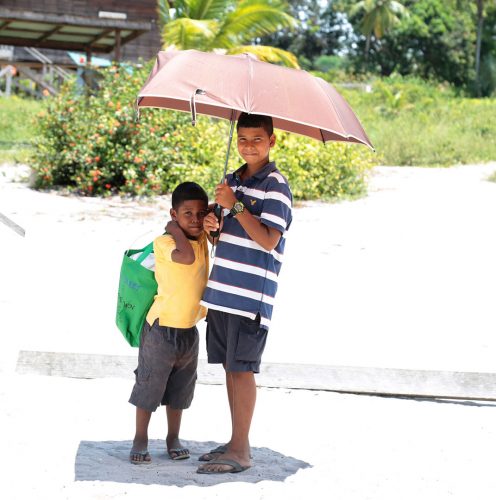More than a century ago, an Arawak family of six—two parents with their three daughters and one son—left their home in a little place called Dawa in the Essequibo in search of an area that had enough trees to provide lumber for building. Their search took them to Mashabo.
The Amerindian community, which now has a total of 450 men, women and children, is situated on the Essequibo Coast across a lake of the same name, the largest of five in the area. Persons getting to and from the village do so using a bus that runs along the road leading from the Essequibo Public Road to the lake at periodic times. Once they get to the lake they call a boatman to come pick them up, using one of several telephone numbers written in boat shed there. The ride across the calm black waters of the lake to the village takes approximately 15 minutes; thousands of palm trees decorate the scenic lake.
Prior to 1983, the lake was a savannah, with a creek running through; then the creek was blocked at one end allowing for the water to back up leading to it becoming the biggest lake on the coast. This was done to provide water for the rice farms that once grew at one end of the lake.
Mashabo, through the Williams family that arrived from Dawa all those years ago, has now become three sections which are linked by two bridges that allow for the residents to get from one section to the other without having to take a boat. However, some persons still prefer to take a boat, especially the residents on the hill called Mashabo Housing Scheme since a lot of the sand there is referred to as ‘dead sand’, which makes it difficult for persons to walk through.
Unice Williams, a granddaughter of that first family, lives in the section called Waddaduri. Her father was the son of the family that moved from Dawa.
“My father came from Dawa with his sisters and parents. His name was Cuthbert Williams and his sisters were Mildred McTurk, Marie Daniels and Eva Williams. I never know my grandparents’ name. He and his sisters and parents were Catholic until the Adventists came and then they converted. I remember we had a troolie structure that my father gave to the Adventist Church for them to set up a school,” she recalled. For some years, the children met in the troolie structure until word got out about the non-functioning primary school on Hamburg Island. After getting permission from officials, members of the community got together, took the building apart and put it back together at Mashabo. A new school was built in its stead during the previous administration.
The school being located on the mission and with no boardwalk like there is today, Williams took the canoe across. “Every Amerindian know to steer their own boat,” Williams said. According to the woman, her family was poor and by 15 she was employed as a domestic worker at Maria’s Lodge to assist her family. Later, she got married and returned with her husband to the village.
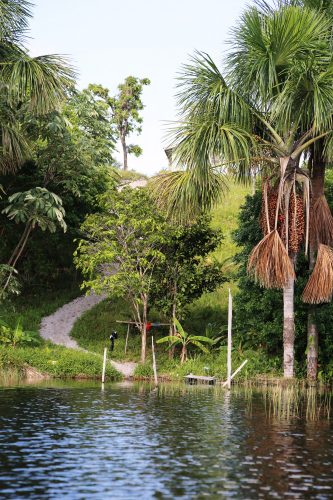
Most of the people in Mashabo provide for their livelihood through cutting lumber and small-scale farming. The community depends on solar panels for lights, charging their phones and watching television. Williams’s family, however, has the convenience of a generator. The community relies on the GTT network mainly but only those living on the mission and in the housing scheme get cellular signals. Williams and those who live in Waddaduri, Mashabo usually walk across to the mission to make their calls.
Abdool Sabar is from Hibernia on the Essequibo Coast. He accompanied his pregnant wife on foot through the savannah and marshes in a bid to see where she was from. He is married to Williams. “You know when Amerindians say is right down deh is not really a small walk and I found out how true that was. We walked for hours. We had started out eight o’clock that morning and walked for seven miles. Every time I asked, ‘girl how far more?’ she would say, ‘is right down there’. You know how much right down deh it had? How she make it, I don’t know and pregnant too. You see these people accustom to this. I get accustom now too. We come here to live on the 20th of May 1990,” Sabar shared.
“When I come here it was very hard. Me din know fuh mek wallaba post or grate cassava, now me can do all them thing that. Because I was an outsider nobody wanted to show me how to do anything. I had a father-in-law who was 75 years and he seh one day ‘come leh we guh de the backdam’. He show me how to get the wallaba… I doing wood work since.”
Sabar said he was the first to have bulls working on his farm. The bulls would pull the wood from the backdam in the bull cart. Though he no longer has bulls, there are persons in Mashabo who still use bulls for their labour.
After he arrived, he said, he cleared most of the bush on the land. His mother-in-law advised him to plant his cassava first, then his pineapples in rows nearby and lastly to plant coconuts. She explained to him, he said, that once he harvested his cassava, his pineapples would soon follow and some years after, his coconuts. This, she had told him, would motivate him to keep farming. He filled his part of Waddaduri with dozens of coconut trees. Sabar is also one of the persons who worked on the boardwalk stretching 660 ft from the mission to Waddaduri. It took them two months, he said. Though the bridge was built through a presidential grant, the physical work was done through self-help by the community.
Six years ago when their daughter died, he said, he had stopped doing much farming and is now trying to get back into it.
Grayson Manzi sat quietly inside. No one even knew he was there until Unice mentioned him. A Peace Corps volunteer, he arrived in the village on August 15 and is the Science teacher at the Mashabo Primary School for three to sixth graders. A New York native, Manzi has been in Guyana a little over two months.
For him, the past months have not been an introduction to Mashabo or Lake Mainstay where he was for a bit, but instead more of an adjustment to Guyana. “Mainstay was my introduction to Guyana. I took it one day at a time. It was more a culture shock for me but at the same time it’s about having the right attitude,” Manzi said.
For the American teacher, there were challenges of poor network signal, no Wi-Fi, no electricity or potable water and having to deal with transportation and everything else. But he has found himself being more grateful for what he had saying that one never knows what they really have until it’s gone. Then laughing, he added, “What doesn’t kill you makes you stronger.”
The man noted that with Mashabo Primary being considered a below-average school, especially in Science, he was assigned to the school to make the subject fun through various teaching skills so that the pupils can better grasp it. He is also assisting teachers with the same so that they can better execute this after he leaves.
While schools were closed in many areas across Guyana, Mashabo Primary had kept its doors open. The teacher noted that they couldn’t afford to take the time out as the pupils need every minute they can get when it comes to learning.
Speaking about his experience in Mashabo, Manzi said, “Everyone is very friendly. Guyana has a reputation of crime but once you get to small communities like these, you see that everyone lives like family and now they see me as one of them and that’s more than I can ask for.”
Toshao Sylvan Raphael was sitting under a coconut tree chatting with some men from the village. I had gone in search of him first as he was expecting my visit and because he is the toshao. However, I found his house open and his whereabouts unknown. I later learnt from neighbours that his son was very ill, and he had gone to visit him. But by the time I had done my other interviews, he had returned.
Raphael migrated to Mashabo from Wakapoa in 1975. He had arrived in search of work but settled after marrying a villager. He and his wife have two children; they lost a son to pneumonia some years ago. This is Raphael’s third consecutive term as toshao. He has served for 12 years now.
Almost every resident is related to the Williams family by blood; others married into the family. While most of the people are Seventh Day Adventists, there is one extended family of 15 who attend the Mashabo Full Gospel Church.
“We have a solar well on the mission so as soon as the sun hot they get water. We would pump water into the black tanks here in Waddaduri which would distribute water to the residents living in this part, but the pump is not functioning now. We really need a well here because we got some old people who can’t reach the creek,” Raphael said.
The mission, he noted, has a nursery and primary school, teachers’ quarters, a kitchen where the members of the community cook for celebrations, the Seventh Day Adventist Church and the Mashabo Health Centre. The health post has just one worker who tends to the sick patients from within the community. However, medication is not always readily available. Asked what would happen if someone was bitten by a labaria – the most common venomous snake around, Raphael said, “If a labaria bite me now, I’d just take out the eye and swallow it. It would counteract the poison… Is poison against poison [as the snake’s eye supposedly creates antibodies within someone who has been bitten]. Or you can grate the tamarind seed and mix it with milk and drink it or use it as a poultice. This would act as first aid until you get to the hospital.” The man also spoke about using local herbs around the area as medicine for diabetes, gall stones and kidney stones. However, he added, they would still request that medications be readily available at the health post.
Speaking about transportation, Raphael noted that secondary school children attend the Aurora Secondary on the coast. A one-way boat trip across the lake costs $3,000 to $4,000 and the bus servicing the road to the lake charges $1,000 each way. He said the children would pay less, not how much less and having to find money for transportation can be difficult for residents. He requested that the government provide a bus for the school children to offset the expense. “I’ve sent five letters to the President for a bus for the school children and we can’t get a bus. I made this proposal to the previous administration for a bus and for a road that links to the village and I also contacted our current president who said that I need to speak to Amna Ally. This was since last year and now this year almost finish,” he lamented.
Up on the hills in another part of Mashabo, children were playing cricket outside but quickly got shy upon seeing visitors and skittered inside their houses. Many of their parents had gone across to the mission for a village meeting.
The most scenic views are from the hills and this was where my visit ended, sitting on one of the benches placed there by villagers to enjoy both the view and the breeze. Friends who were visiting also mentioned with relaxed smiles on their faces that Mashabo would be nice to retire to someday.
Mashabo holds its Heritage Day festivities next Sunday, September 30.
